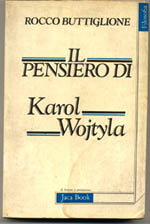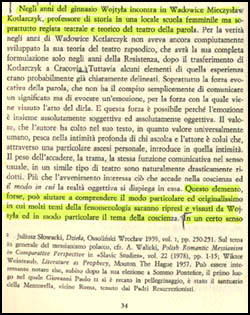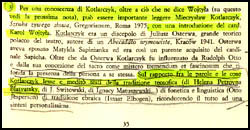Since he was a young man in high school, Karol Wojtyla was deeply influenced by his mentor Wadowice Kotlarczyk, a History teacher and theater director. Later he and Wojtyla co-founded the experimential Rhapsodic Theater. It was Kotlarczyk who initiated Wojtyla in Phenomenology.
It happens that Kotlarczyk was inspired by Helena Petrovna Blavatsky, the Russian founder of modern Theosophism.
Blavatsky, like Wojtyla, taught that the religions are very similar to one another, all coming from the same first source.
We present below a reproduction of two documents with their respective English translations from Italian and French:
1. Reproduction of two pages of the book Il Pensiero of Karol Wojtyla (The Thinking of Karol Wojtyla) by Rocco Buttiglione, an Italian contemporary philosopher and politician. In it, the author explains the influence Kotlarczyk exerted over Wojtyla, as well as Blavatsky's influence on Kotlarczyk.
2. Reproduction of a page from the French magazine Le Monde des Religions (The World of Religions), which presents a summary of Blavatsky's position.
Regarding Wojtyla's indirect initiation into the thinking of Blavatsky by means of Kotlarczyk:
(Original Italian text highlighted at right)
“In his high school years, Wojtyla met Wadowice Mieczyslaw Kotlarczyk, a history teacher at a local girls' school, but also a theater director and theorist on the role of the word in the theater. .... The importance of the event, plot, and normal ways of communication were drastically reduced in this kind of theater. More than on the event, the focus was on what happens in the inner conscience and the way objective reality is unveiled in it. Perhaps this can help us understand the unique and most original way Wojtyla interpreted and lived many subjects of Phenomenology, namely, the theme of consciousness. In a certain sense, his first initiation into Phenomenology was made on this indirect and non-orthodox philosophic path of the theory of the theater, above all, in his experience as an actor under the direction of Kotlarczyk(3).
"Note 3: To understand Kotlarczyk, in addition to what Wojtyla says about him, it seems important to read Mieczyslaw Kotlarczyk, "Sztuka zywego slowa" (Gregorianum, Rome, 1975), with an introduction by Cardinal Karol Wojtyla. .... Regarding the relation that exists between the [spoken] word and the [seen] object, Kotlarczyk had read and meditated on texts from the theosophist tradition of Helena Petrovna Blavatsky, J, Switowski, Ignacy Matuszewski..., and from the Hebrew tradition - Ismar Elbogen - according to which everything is reduced to a personal synthesis" (Rocco Buttliglione, Il pensiero di Karol Wojtyla, Milan: Jaca Books, 1982, pp. 34-5)
|



 |
Regarding Helena Blavatsky, the French magazine
Le Monde des Religions gives this information:
(Original French text highlighted below)
"Helena Blavatsky, the founder of the Theosophic Society, established her headquarters in Adyar, India, rather than in the West. It was the 1880s. In that epoch, the journey [to India] was quite long and difficult. But her choice of that place reflected her whole philosphy.
"Helena Blavatsky believed in a primordial tradition, a first source from which all the religions issued. This would be an Eastern tradition. 'The idea that all the religions are alike existed already among certain Christians,' remarks historian Pierre Barrucand, 'and Helena Blavatsky and her disciples had adopted it as their own.' According to Helena Blavatsky, the Tibet was the center of the Great White Brotherhood, a society of cosmic masters who rule the planet" (Actualite des Religions, dossier about the New Age, article "Pas si nouveau," September 1999, p. 45).
|
